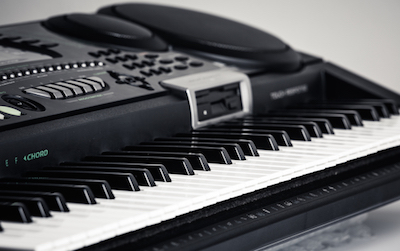Considering purchasing a digital piano? They can make a great addition to your home for a variety of reasons. They are:
- Low maintenance
- Easy to store
- Easy to transport
- No tuning required
And if you live in a small space, they allow you the convenience of being able to play quietly whenever you desire, then tuck it away until you’re ready to play another day.
All great reasons to buy. Yet now comes the important question: Do you purchase a high end or low end digital piano?
A lot goes into making that final decision. You can start by discovering why you want a digital piano in the first place.
- Are you brand new to playing the piano?
- What are your goals?
- What is your budget?
And of course the biggest question of all: What are the differences between high end and low end digital pianos?
Digital pianos don’t use the string/hammer concept to make sound like their acoustic counterparts. Instead, digital pianos use samples to generate sound. So each manufacturer of a digital piano spends its time and energy recording sounds and placing them into their final production digital pianos. That difference is where quality comes into play. They must record each sound at different volume levels and then arrange them to make the appropriate sound, depending on how a player presses the key. This process is called modeling. And it’s what separates high end from low end digital pianos.
High end pianos will have more precision in the modeling process. The manufacturer will have paid a lot more attention to the details of successfully emulating the interaction between different strings, different notes. This means it will have a richer, fuller sound, and be closer to the sound an acoustic piano produces.
But of course that isn’t the only difference. It also comes down to the feel of the piano. And arguably so, a professional piano player will tell you this is one area that matters most. Acoustic piano keys are weighted, using a particular mechanism to produce the sound when a key is pressed. When pressed, a felt-hammer is used to press different amounts of pressure to the strings in order to produce different sounds. This “feel” comes through loud and clear on an acoustical. It’s also what separates high end from low end digital pianos.
High end pianos emulate this. Low end digitals will only use a spring and a graded hammer system to produce the same key resistance, which means resistance will only go so far. High end digitals use a replicated piano mechanism that is far superior, and does a great job at transferring skill level from acoustic to digital.
While these are the primary differences, they are by no means all. Yet sound quality is ultimately the most important thing. How its produced, and how its amplified. High end digital pianos will also put more focus in on the speaker system. What you hear is what you’ll remember. So they spend the extra time creating acoustic soundboards and advanced speaker systems that will provide you with a high quality sound. You’ll also increasingly find more opportunity and marked differences in the features, everything from input/output technology, to different sounds and options for production.
If your goal is to become the best piano player you can, investing in a high end digital piano can give you more opportunity to create better music. And when you have better equipment, better sound, you’ll automatically have more desire. Stop by today to find out what equipment is right for you.

